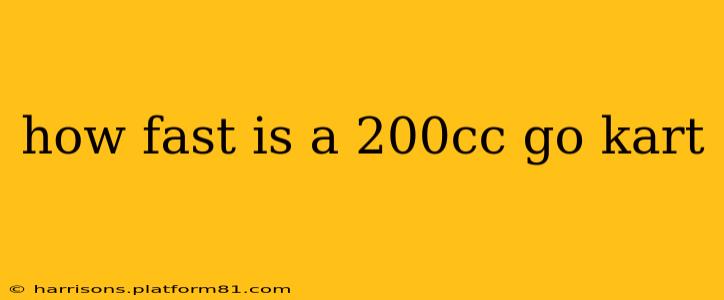The speed of a 200cc go-kart isn't a simple number. Several factors significantly influence its top speed, making a definitive answer impossible without more specifics. However, we can explore the key elements that determine how fast your 200cc go-kart can go and answer some frequently asked questions.
Understanding the Variables Affecting Go-Kart Speed
A 200cc engine is a common size for go-karts, but the resulting speed varies dramatically based on several factors:
- Engine Type: Different engine designs (e.g., four-stroke vs. two-stroke) affect power output and therefore speed. Two-stroke engines generally offer higher horsepower at lower weights, leading to potentially higher speeds. However, four-stroke engines are becoming increasingly popular due to their improved fuel efficiency and longevity.
- Transmission: The type of transmission (automatic centrifugal clutch, manual, etc.) influences acceleration and top speed. A well-tuned transmission can maximize the engine's power delivery.
- Chassis Design: The go-kart's frame, weight, and aerodynamics all play a crucial role. A lighter, more aerodynamic kart will generally be faster than a heavier, less aerodynamic one.
- Tire Type and Condition: The grip provided by the tires significantly impacts acceleration and top speed. Worn or unsuitable tires drastically reduce performance.
- Gear Ratio: The gearing influences the kart's acceleration and top speed. A higher gear ratio prioritizes top speed but reduces acceleration, while a lower gear ratio prioritizes acceleration but reduces top speed.
- Track Conditions: The surface of the track (smooth asphalt, rough dirt, etc.) influences traction and consequently speed. A smoother track generally allows for higher speeds.
- Driver Skill: The driver's skill significantly impacts the kart's performance. An experienced driver can extract more speed from the kart than a novice.
How Fast Can a 200cc Go-Kart Go?
While a precise speed is impossible to give without detailed specifications, a well-maintained 200cc go-kart on a smooth track, with optimal conditions and an experienced driver, could reach speeds between 30 and 50 mph (48 and 80 km/h). However, this is a broad range, and speeds could be considerably lower or slightly higher depending on the factors mentioned above. Many commercially available 200cc karts will be closer to the lower end of this range, particularly those designed for recreational use.
What is the Average Speed of a 200cc Go-Kart?
There's no single "average" speed for a 200cc go-kart. The average speed will heavily depend on the factors outlined earlier. A more realistic average might be closer to 35-40 mph (56-64 km/h), taking into account the variations in kart specifications and track conditions.
What Factors Affect the Top Speed of a Go-Kart?
As discussed above, several factors influence a go-kart's top speed. These include the engine type, transmission, chassis design, tire condition, gear ratio, track conditions, and driver skill.
What is the Fastest 200cc Go-Kart?
There's no single "fastest" 200cc go-kart. The fastest kart will be the one with the optimal combination of the factors we've discussed—a powerful, lightweight chassis with an efficient engine, excellent tires, a well-tuned transmission, and a skilled driver on a perfectly smooth track.
How Can I Increase the Speed of My 200cc Go-Kart?
Improving your go-kart's speed involves several potential upgrades. However, always prioritize safety and ensure any modifications are done by a qualified mechanic. Some options include:
- Engine Tuning: A professional tune-up can optimize the engine's performance.
- Lightweight Components: Replacing heavy parts with lighter alternatives can improve performance.
- Aerodynamic Improvements: Improving the kart's aerodynamics can reduce drag.
- High-Performance Tires: Using higher-quality tires with better grip can significantly impact speed and handling.
Remember to always prioritize safety when modifying or operating your go-kart. Follow all safety regulations and wear appropriate protective gear. Consult with a qualified mechanic before making any significant modifications.
